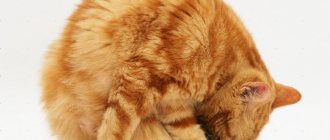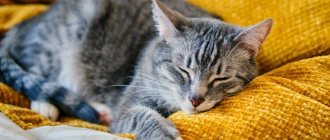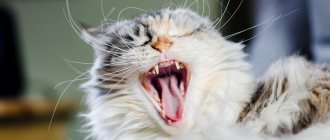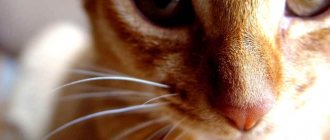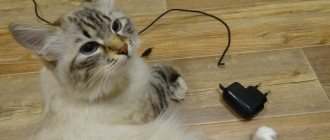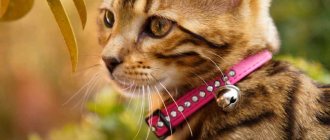11/13/2021 92,465 Diseases and treatment of cats
Author: Olga
When a cat itches or diligently licks itself, this is a completely normal and natural phenomenon. However, animal owners should be wary of their too frequent manifestation, which is accompanied by anxiety and irritability. In this case, often the animal already needs help. Remember that itching is not a disease, but its first symptom, so this manifestation cannot be ignored.
[Hide]
Causes of obsessive licking and gnawing of cats
So, have you noticed that your pet has started scratching, licking and even gnawing itself frequently? This is a clear sign that your cat either has parasites or there are other causes of itching and irritation. The cat will not just constantly lick and scratch himself; this is a defensive reaction to the fact that something is bothering him. Let's consider all possible causes and signs.
Fleas
This is perhaps the most common reason that a cat scratches and licks itself all the time, especially in the area above the tail and on the paws. These parasites can even appear in pets, so no one is safe from them. At the same time, if you do not see small black dots on your cat’s fur, this does not mean that there are no fleas. They can still be very tiny (nits) or simply in the form of eggs on the fur. However, their vital activity will already cause enormous inconvenience and discomfort to the pet.
Other parasites
In addition to fleas, your cat may develop other skin parasites that can cause anxiety and discomfort. The pet will also itch and lick itself a lot. A clear sign of the presence of any parasites is if the cat tries to gnaw something out of its fur. The animal intuitively tries to remove annoying enemies in this way. The most common of them are lice and ticks, which in turn are also dangerous because they carry infections and viruses.
Allergy
If you regularly treat your cat's fur for parasites and the veterinarian's analysis does not show their presence, the cause of the itching may be an allergy. Pedigree cats and cats suffer from it especially often. This may be, like in humans, a manifestation of sensitivity to food, furniture upholstery, or some chemical component. A particularly clear sign of an allergy is when a cat licks itself heavily, thus trying to scratch its nose and lips.
Allergies can be not only to food components, but also seasonal or, for example, to dust and pollen. It is important to get tested and identify the irritating allergen as soon as possible.
Bacteria and fungi
Various microflora live on the skin and in the body of any even healthy animal. But if the cat’s body is weakened, experiencing some kind of stress, lack of vitamins, etc., this can cause an increase in the amount of pathogenic microflora. Because of this, various types of skin inflammation, rashes, itching occur, and the pet’s general condition worsens. Most often, the cause of this phenomenon lies in bacteria and all kinds of fungi. By the way, they can also be transmitted through human hands, because the cat constantly licks itself.
Skin diseases
As a rule, they are all infectious in nature and occur after a pet comes into contact with an infected object. Sometimes it is enough for a cat to go outside just once to pick up some kind of infection. Often, diseases such as pyodermatitis, cheyletiellosis, demodicosis, and scabies occur. They are also caused by mites that parasitize the upper and deep layers of the skin. Severe itching in the first stages very quickly develops into general skin damage and baldness.
If a cat's skin problems are detected, the cat owner needs to thoroughly wash their hands with soap and maintain personal hygiene, since many viruses and bacteria can be transmitted to human hands.
Hormonal disorders
Another of the many reasons why your pet is scratching and licking excessively. As a rule, the cat may experience symptoms of all the previously described causes, for example, baldness, itching, urticaria, and so on. But this is not always due to parasites or diseases. This reaction can be caused by endocrine disruptions, which must be correctly determined by a veterinarian. A therapeutic diet and corrective therapy are prescribed.
Diagnostic measures
Constant licking of fur is an alarming symptom, indicating that pathological processes are occurring in the animal’s body, often associated with mental instability and severe stress. Therefore, it is recommended to immediately take the cat to the veterinarian to identify the causes of this phenomenon and make an accurate diagnosis.
The veterinarian will conduct a visual examination of the animal and prescribe a number of laboratory tests. If dermatitis, fungal infection or infectious skin diseases are suspected, a bacteriological culture from the affected area is taken. If the doctor suspects that the cat has problems with the functioning of the endocrine system, it will be necessary to take a blood test for hormones.
Treatment
If you notice that your cat is constantly itching, licking itself, and at the same time acting restlessly, hitting its tail, you should immediately take your pet to the veterinarian. It is better not to try to establish the cause and diagnosis yourself, since many of the symptoms are similar to each other. Laboratory analysis and proper examination will be required.
If the reason that the cat is constantly itching, licking and licking itself lies in fleas and other skin and fur parasites, then external treatment is prescribed. The veterinarian may prescribe special drops or sprays, or recommend treating the animal with medicated shampoo. As a rule, using all these drugs several times helps to quickly remove itching and irritation and overcome parasites. In the future, only timely prevention will be required.
If the skin ailment is caused by an infection or fungus, medicinal sprays and drops will also help in the early stages. But, as practice shows, special medications and antibiotics may still be required. If the cat is constantly itching, licking its face, scratching its ears and eyes, antihistamines are prescribed. An accurate analysis is performed and the source of the allergy is determined.
Dermatitis in cats
Itching and pain of the skin can be caused by dermatitis.
This disease is caused by an immune disorder and the activation of opportunistic microorganisms on the animal's skin. Dermatitis is always accompanied by inflammation of the epidermis. With moderate inflammation, the animal becomes restless, itching, and the cat constantly licks its fur. Suspecting the disease at this stage is quite problematic.
We recommend the article: Why does a cat limp on its front leg?
In most cases, dermatitis is accompanied by visible symptoms - severe peeling of the skin, the formation of rashes, wounds and erosions. The rashes are most often localized on the pet's face, near the ears and on the neck.
Treatment is carried out using external agents, but only after identifying the pathogen.
Veterinarian advice
It is no secret that many parasites and viruses are transmitted from one animal to another, through the hands of people, but you should not be afraid and limit the freedom of a cat. Of course, there is no need to throw your pet into a pack of stray cats, but letting it out for a walk on the balcony or in the country is quite possible. Like any animal, cats also need fresh air and sun. It is enough just to keep the animal clean and carry out timely antiparasitic treatment.
Do not forget about a proper and balanced diet, which is also the key to your pet’s health. If he has a strong immune system, then no infection will be scary to him. Do not feed prohibited foods, sweets, salty and smoked foods. All this can cause or provoke the occurrence of food allergies. Pay attention to when your pet licks.
And finally, the last piece of advice is love and affection. Remember that your cat is a living creature that needs your care and attention. A change of owner or a change in your behavior can cause stress in your pet. And stress, as you know, is the first step to illness. If you want to pet an animal, but it is nervous and wags its tail, it is better to leave it alone, do not squeeze or pick it up without the desire of the pet itself. Remember that he also has the right to peace and rest.
Sorry, there are no surveys available at this time.
Problems not related to diseases
In some cases, excessive licking is not caused by any health problems.
This can be caused by various reasons, the most common of which are
- Stressful situations cause nervous tension, but in this case the cat’s behavior also changes. Her tail quivers, she shakes constantly, and her pupils are greatly dilated. Such conditions can occur during movement, with a sudden change in environment, or with aggressive behavior of other animals or owners.
- The desire to get rid of foreign odors, which most often manifests itself when a cat is stroked by a stranger or after returning from a walk in the fresh air.
- Fear of closed spaces, which may seem strange, but staying indoors for a long time has a negative effect on the cat’s psyche. In this position, he can lick himself to the point where serious wounds occur.
- Active grooming in the tail area when the female is in estrus, which is an attempt to clean the tail.
All pathological conditions should always be under observation, and the animal should not be deprived of attention.
Frequent and prolonged licking quickly leads to habituation, called excessive grooming. This is a mental disorder that is most common among purebred cats, but is also common in regular pets.
Video “Cats also love to swim”
Do you think cats don't like to bathe? They love it so much! This video is proof of our words. Moreover, timely and proper bathing will help your pet not only be clean, but also protect it from itching and fleas.
Was this article helpful?
Thank you for your opinion!
The article was useful. Please share the information with your friends.
Yes (81.82%)
No (18.18%)
X
Please write what is wrong and leave recommendations on the article
Cancel reply
Rate the usefulness of the article: Rate the author ( 20 votes, average: 4.45 out of 5)
Discuss the article:
Dangerous complications
Excessive grooming is a fairly serious deviation that can lead to negative consequences. Lack of timely and proper care can lead to:
- The formation of wool plugs in the cat's stomach and intestines, which leads to obstruction and accumulation of feces.
- The formation of non-healing wounds, ulcers or scratches, which are open gates for various infections. In severe cases, this can lead to the formation of necrotic lesions. To prevent this, wounds should be treated with antiseptic sprays and ointments and covered with bandages and plasters.
- The natural growth of the coat is disrupted and its protective functions deteriorate.
Excessive grooming is a pathology that requires a special approach and great responsibility. If it is caused by physiological health problems, treatment should be aimed at eliminating them. After recovery from the underlying disease, pathological licking will go away spontaneously.
Psychological problems will require more attention. Don't limit their freedom, play for at least 15-20 minutes a day, pet them regularly and show them love.
When moving, take familiar things with you, such as a cat house, scratching post or bed. In severe cases, veterinarians may prescribe medications to normalize the cat's condition.
Prevention means
Only a specialist can cure dangerous licking of a cat’s fur. To protect your pet from overgrooming, you should follow some simple rules for keeping cats:
- try to avoid stressful situations in your pet’s life, and if they arise, use homeopathic sedatives;
- carry out antiparasitic prevention in a timely manner;
- create the right diet and follow it;
- Monitor your pet's health and prevent illness.
Skin pathologies (allergies, flea dermatitis, tick-borne infection, etc.)
Flea dermatitis Dermatological problems in cats are usually accompanied by constant itching of the skin. To calm it down, animals lick themselves. Persistent licking often provokes hair loss in the areas being licked. The following skin diseases can lead to this behavior:
- allergies to food, pollen of flowering plants, household chemicals, cosmetics used by the owner, etc.;
- dermatitis caused by fleas;
- infections caused by ectoparasites, such as ticks and lice-eaters;
- diseases caused by fungi.
Worm infestation can also cause compulsive licking. Parasitic diseases are accompanied by itching in the anus. Trying to calm it down, the animal licks this area, as a result of which, over time, bald spots form around the anus. To eliminate this problem, antiparasitic veterinary drugs are used.
To choose a suitable anthelmintic, you need to find out what type of parasites attacked the cat’s body. This can only be done in a veterinary clinic.
The desire to cleanse itself as a reaction to foreign odors on the fur
Cats are very clean creatures. In addition, they have an excellent sense of smell, thanks to which they are able to sense even subtle odors. If the pet feels that its fur smells of something, it will begin to lick it until it completely gets rid of it. Sometimes this desire leads to bald spots appearing on the body of an animal that washes itself too zealously.
